
The demographics of Estonia in the 21st century result from historical trends over more than a thousand years, as with most European countries, but have been disproportionately influenced by events in the second half of the 20th century. The Soviet occupation (1944–1991), extensive immigration from Russia and other parts of the former USSR, and the eventual restoration of independence of Estonia, have all had a major effect on Estonia's current ethnic makeup.
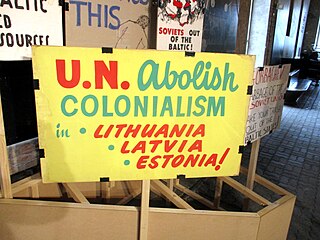
The three independent Baltic countries – Estonia, Latvia, and Lithuania – were invaded and occupied in June 1940 by the Soviet Union, under the Molotov–Ribbentrop Pact between Nazi Germany and the Soviet Union in August 1939, immediately before the outbreak of World War II. The three countries were annexed by the Soviet Union as "constituent republics" in August 1940. Most Western countries did not recognise this annexation, and considered it illegal. On 22 June 1941, Nazi Germany invaded the Soviet Union and within weeks occupied the Baltic territories. In July 1941, the Third Reich incorporated the Baltic territories into its Reichskommissariat Ostland. As a result of the Red Army Baltic Offensive of 1944, the Soviet Union recaptured most of the Baltic states and trapped the remaining German forces in the Courland Pocket until their formal surrender in May 1945.

The Estonian War of Independence, also known as the Estonian Liberation War, was a defensive campaign of the Estonian Army and its allies, most notably the United Kingdom, against the Soviet Russian westward offensive of 1918–1919 and the 1919 aggression of the pro–German Baltische Landeswehr. The campaign was the struggle of the newly established democratic nation of Estonia for independence in the aftermath of World War I. It resulted in a victory for Estonia and was concluded in the 1920 Treaty of Tartu.
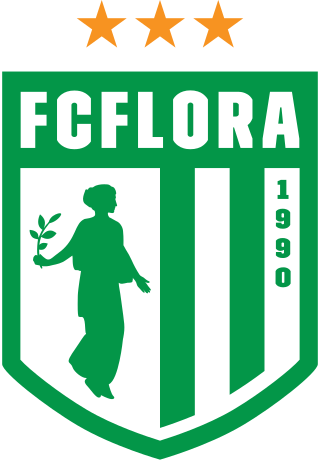
FC Flora, commonly known as Flora Tallinn, or simply as Flora, is an Estonian professional football club based in Tallinn that competes in the Meistriliiga, the top flight of Estonian football. The club's home ground is Lilleküla Stadium.
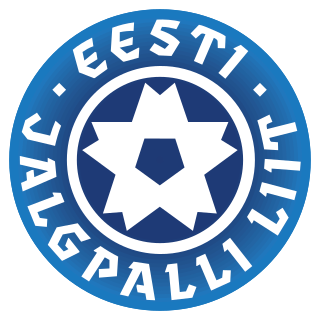
The Estonia men's national football team represents Estonia in international football matches and is controlled by the Estonian Football Association, the governing body for football in Estonia. Estonia's home ground is Lilleküla Stadium in the capital city Tallinn.

Kihnu is an island in the Baltic Sea. With an area of 16.4 km2 (6.3 sq mi), it is the largest island in the Gulf of Riga and the seventh largest island of Estonia. With a length of 7 km (4.3 mi) and width of 3.3 km (2.1 mi), the island's highest point is 8.9 metres (29.2 ft) above sea level.

The Estonian men's national ice hockey team is the ice hockey team representing Estonia internationally. The team is controlled by the Estonian Ice Hockey Association, a member of the International Ice Hockey Federation.
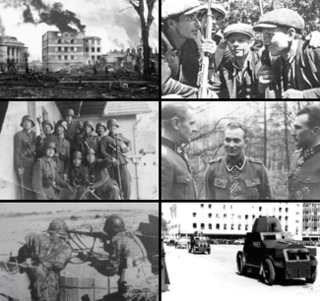
Estonia declared neutrality at the outbreak of World War II (1939–1945), but the country was repeatedly contested, invaded and occupied, first by the Soviet Union in 1940, then by Nazi Germany in 1941, and ultimately reinvaded and reoccupied in 1944 by the Soviet Union.
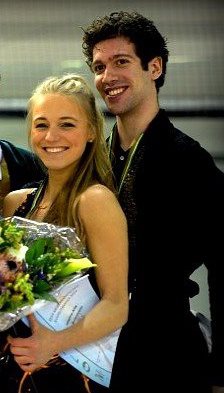
The Estonian Figure Skating Championships are a figure skating national championship held annually to determine the national champions of Estonia. Medals may be awarded in the disciplines of men's singles, women's singles, pair skating, and ice dancing on the senior, junior, and novice levels.
The FIBA U18 European Championship or FIBA U18 EuroBasket, originally known as the European Championship for Juniors, is a youth men's basketball competition that was inaugurated with the 1964 edition. It was held biennially through the 2002 edition. From the 2004 edition onward, it has been held every year. It serves as the qualification tournament for the FIBA Under-19 World Cup, for the FIBA Europe region. The current champions are Serbia.

Estonia, officially the Republic of Estonia, is a country by the Baltic Sea in Europe. It is bordered to the north by the Gulf of Finland across from Finland, to the west by the sea across from Sweden, to the south by Latvia, and to the east by Lake Peipsi and Russia. The territory of Estonia consists of the mainland, the larger islands of Saaremaa and Hiiumaa, and over 2,300 other islands and islets on the eastern coast of the Baltic Sea, covering a total area of 45,335 square kilometres (17,504 sq mi). Tallinn, the capital city, and Tartu are the two largest urban areas of the country. The Estonian language is the indigenous and official language of Estonia; it is the first language of the majority of its population, the world's second-most spoken Finnic language as well as the third-most spoken Uralic language.

Estonia competed at the 2016 Summer Olympics in Rio de Janeiro, Brazil, from 5 to 21 August 2016. It was the nation's twelfth appearance at the Games and seventh consecutive in the post-Soviet era.

Kaja Kallas is an Estonian politician and the current prime minister of Estonia since 2021, the first woman to serve in the role. The leader of the Reform Party since 2018, she was a member of parliament (Riigikogu) in 2011–2014, and 2019–2021. Kallas was a member of the European Parliament in 2014–2018, representing the Alliance of Liberals and Democrats for Europe. Before her election to Riigikogu, she was a lawyer specialising in European competition law.

Bolt is an Estonian mobility company that offers ride-hailing, micromobility rental, food and grocery delivery, and carsharing services. The company is headquartered in Tallinn and operates in over 500 cities in more than 45 countries in Europe, Africa, Western Asia and Latin America. The company has more than 150 million customers and more than 3 million driver and courier partners. The company has plans for an initial public offering in 2025.

The Latvian-Estonian Basketball League, known as Paf Latvian-Estonian Basketball League for sponsorship reasons, is the top-tier men's basketball league in Latvia and Estonia. The competition was introduced in 2018 and is organised by the Latvian Basketball Association and the Estonian Basketball Association.

Estonia competed at the 2022 European Championships in Munich from August 11 to August 22, 2022.













